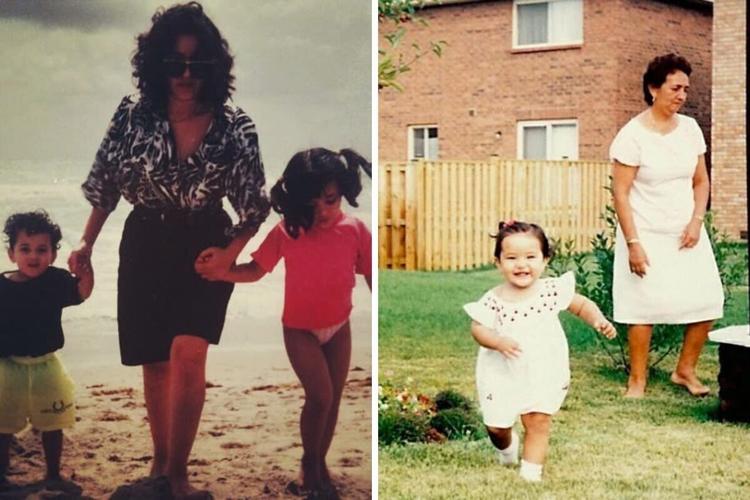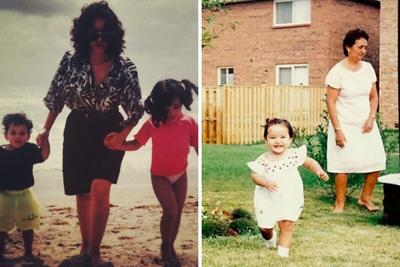After becoming a mother myself, I began to think of my childhood as measured in two phases: when my mother had childcare, and when she did not.
ThereŌĆÖs my early childhood, when my mother had started a career in accounting and had help. My grandmother or aunts would fly up from western Mexico to live with us in central Mississauga for months at a time. My mother, in turn, got to keep a part of home close to her; she was the only one of her six siblings to move away.
Once my brother and I started grade school, my motherŌĆÖs family flew up less often. Money was tight in the years my parents started their family. After-school program fees were a luxury they couldnŌĆÖt afford and a single-income household was out of the question.┬Ā
My motherŌĆÖs solution? Opening a home daycare, where in addition to being with her kids more often my mother could earn a living by taking care of others in the neighbourhood, which she did for almost a decade.┬Ā

Chantal Braganza’s mother, Rubi, father and brother, Corey, in their Mississauga backyard.┬Ā┬Ā
pereira, taniaHer home became her workplace, and the way she cared for us became the way she cared for her clientsŌĆÖ children, too: patiently, compassionately, and with a knack for wrangling the varying types of chaos a household filled with preschool-aged children can invite. I remember the towers of plastic baby wipe boxes that got cleaned and repurposed into boxes for crayons and toy cars. There were meltdowns of every kind, over anything from nap times┬Āto how a hot dog was cut up for afternoon snack. She handled them all.┬Ā
There are a few advantages to growing up in this kind of environment. I was always around children. I never felt alone. There was always some new toy to share, always enough of us to put on some impromptu basement production from a scene of ”The Lion King”┬Āwith bathrobes for curtains and a few folded sheets of construction paper costumes.┬Ā
I also learned, from an early age, how much work goes into caring for infants, let alone more than one: the endless diaper-changing; the mixing of milk and cutting vegetables into tiny, chewable pieces; the way the laundry room seemed to constantly roar with activity like a shipŌĆÖs boiler room.┬Ā
I grew up understanding that caring for a child had intrinsic value. It was what, for a time, my mother did for money, and she was very good at itŌĆöif often overworked and underpaid for it, too. Years later, when staring down the idea of having a baby myself, I thought this stage of my upbringing would prepare me for the crucible of early mothers. After the birth of my first child, it was quickly clear I was sorely mistaken.┬Ā
As a young adult I often bristled at the way our culture looked at child care work with disdain, whether it was silly plot points about troublesome nannies in movies, or the more serious fact that child-care workers in this country are overwhelmingly racialized and immigrant women who, to this day, arenŌĆÖt paid enough.┬Ā

Chantal Braganza, centre, with her brother, Corey, and mother, Rubi, at an Etobicoke McDonald’s.
suppliedThis knowledge made it a little too easy for me to brush off the anecdotes IŌĆÖd hear from new parents in my life about how hard it is, as though the thing that made early parenthood difficult was only the physical work IŌĆÖd witnessed growing up.┬Ā┬Ā
As a result, I ran into pregnancy, birth, and those first few weeks of learning to nurse a baby headfirst, convinced that if I could just master the act of parentingŌĆöof what I understood as motherhoodŌĆöthings would fall into place. I was prepared to stay up all night, wash bottles, and launder blankets forever, as if all thatŌĆÖs what parenting was.
But the post-partum anxiety induced by an exceptionally difficult first few weeks of nursing; the world-reordering knowledge of my motherŌĆÖs experience by living a different version of it myself; the changed relationship I had to work and ambition: no upbringing could have prepared me for it. ThatŌĆÖs partly, I realize now, the point. To be materially and emotionally present for your child day in, day out in the hours you have together will change you, and force you to become comfortable with constant change itself.
No upbringing could have prepared, I imagine, anyone for what the first couple of years of COVID also taught many of us: that the lives of many parents are only made possible by a supportive network of childcare. The months I spent working in my kitchen with my first, then second, child at home put into stark focus just how much was on my motherŌĆÖs shoulders the years her parenting and work life took place in the same space day in, day out.
IŌĆÖve since come to understand that the identity associated with having a child and the ongoing act of caring for one are tightly linked, but also distinct in ways that are often obfuscated. New parents truly do have it hard. Perhaps never more so than now: weŌĆÖre in the midst of a housing and affordability crisis, and staring down our climate and geopolitical realities can make thinking about the future in terms of generations difficult.┬Ā┬Ā
But the label of ŌĆ£parentŌĆØ does not encompass all of what it means to care for a child; to ignore this is to devalue the labour of those who care for our children throughout the week and make our lives outside of parenthood, not to mention our economy, possible. It remains the best lesson my childhood taught me, and I have my motherŌĆÖs early career to thank for that.






























To join the conversation set a first and last name in your user profile.
Sign in or register for free to join the Conversation